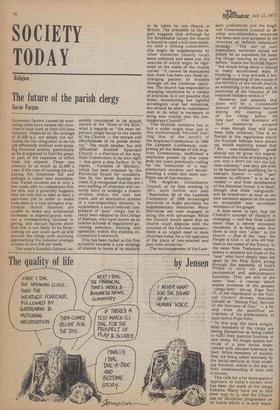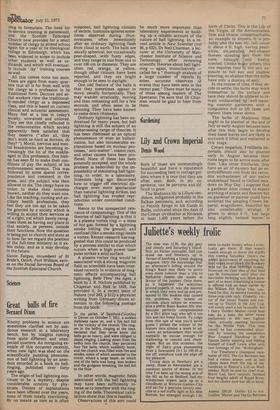SOCIETY TODAY
Religion
The future of the parish clergy
Gavin Fargus
Economic factors caused by everrising costs have caused the churches to look hard at their full-time ministry. Stipends on the average of £1,500 p.a. are simply not sufficient for the clergyman to do his job efficiently without ever-pressing financial anxiety, particularly as he is expected to find the greater part of his expenses of office from his stipend. These can amount to as much as £1,000 a year, if the cost of running his car, paying his telephone bill and postage is taken into consideration. Parish incomes are in only a few cases able to compensate him for this, and it generally happens that his wife has to take at least a part-time job in order to make ends meet in a very stringent way. Central church finances are unable to make any substantial increases in stipend-grants without a corresponding increase in giving, and annual figures show that this is not likely to be forthcoming on any scale such as will provide the clergy with anything approaching the national average income of over £40 per week.
This year's Scottish General As sembly considered in its annual, review of the 'State of the Kirk,' what it regards as "the most important single factor in the health of the Church — the morale and effectiveness of its parish ministry." The much smaller, but still influential Scottish Episcopal Church — a Province of the Anglican Communion in its own right — has gone a step further. In its report, ' Varieties of Ministry,' which has been remitted by the Provincial Synod for consideration by the seven Scottish dioceses, it is recognised that the present staffing of churches will certainly have to undergo a drastic revision within the next few years, and an alternative scheme of a non-stipendiary ministry, to supplement a much-reduced complement of paid ' clergy, has already been adopted by the College of Bishops, who have drawn up an interim scheme of regulations governing selection, training and operation within the existing ecclesiastical framework.
This has been hailed as the first initiative towards a new strategy of mission in terms of its ministry
to be taken by any church in Britain. The preamble to the report suggests that although for the foreseeable future the church is bound to need a full-time ministry with a lifelong commitment, this might be supplemented by other ministries (mainly local), some ordained and some not, the exercise of which might be regulated as the needs of the church varied: " It cannot be maintained that there has been one fixed unchanging pattern of ministry through all the Christian centuries. The church has responded to changing conditions by a variety of practices. Is it not possible that today, maintaining her rightful sovereignty over her ministries, she should be able to commission :men to do what is necessary to .bring new vitality into the contemporary C hurch? " This Scottish initiative has in fact a wider origin than just in this northernmost Province (barring that of the Arctic), of the Anglican Communion. In 1968 the Lambeth Conference, comprising all the bishops of the Anglican Communion, reaffirmed a resolution passed by that same body ten years previously, calling for the institution of a supplementary ministry and recommending a wider and more confident use of this ministry.
The Anglican Consultative Council, at its first meeting in 1971, went further and said: " Resolution 89 of the Lambeth Conference of 1958 encouraged provinces to make provision for supplementary ministries. Many Provinces are now engaged in' doing this with advantage. While the Council would agree that no church could dispense with the vocation of the full-time ministry, there is an urgent need in most churches today for a full appraisal of the place of non-salaried and part-time ministries."
The encouragement of the Lam
beth conferences and the Anglican Consultative Council to de, velop non-stipendiary ministries has been seen and accepted by the churches as definite missionary' strategy. 'The use of non stipendiary ministers would not simply be an expedient for keep. ing things running as they were before," states the Scottish report, "but would bring about a change in many accustomed ways of thinking — a way towards a better understanding of the nature of the ministry of the whole church, as Something to be shared, and, in particular of the function of the ordained ministry within it."
However, one suspects that there will be a considerable amount of professional Jealousy among the existing ranks of the clergy before the new part time ministers will find themselves — even though they will have been fully ordained. This is reflected in the regulations which the Scottish bishops have drawn up, which explicitly states that
"the non-stipendiary priest should not be given the impression that this form of training is in any way a short cut into the runtime ministry," and they are even to be barred from qualifying for a bishop's licence — only "permission to officiate" is to be accorded — and from membership of the Diocesan Synod, It is likely, though, that these ' safeguards ' will be withdrawn as soon as the new ministers appear on the scene as acceptable and accredited ministers of the gospel.
It does seem, in fact, that the Church's concept of ministry is changing — and this from rather more than a merely economic causation. It is being seen that there is only one ' order ' in the church — that of the ' laos,' the People of God — all who are baptised in the name of the Trinity. in the same New Testament terms, orders in ministry are those of the laos ' who have simply been Set apart by the Holy Spirit acting through the assembly of God's People to carry out pastoral. sacramental and administrative functions. They are still of the same laos,' a concept which makes nonsense of the present ' clergy-laity ' set-up. Pope Paul VI, in the imprimatur to the Vatican Council decrees, describes himself as " Bishop Paul, Servant of the Servants of God" — a far step from the pontifical ascriptions of his predecessors, at least before Pope John. In this way the more enlightened members of the clergy are seeing themselves as being called to fulfil their pastoral function in new terms. No longer quaint survivals of a past social order, viewed with amused tolerance by their fellow-members of society, they are being taken seriously by the social services in their enabling function, which is the key to their understanding of their role in society.
This calls for a far more positive approach to today's society than has been the mark of the clergy hitherto. Many have yet to find their way to it, and the Church has an education programme on its hands which it is only begin fling to formulate. The need for in-service training is paramount, and the Scottish Episcopal Church now provides for a small number of clergy to attend school again for a year at its theological college in Edinburgh, which has been widened in scope to include other students as well as ordinands, and which will eventually include lay' training courses as well.
All this comes none too soon. There are signs from many quarters that all is far from well with the clergy as a profession in its traditional form. Doctors and social workers view the traditionally-minded clergy as a depressed class, and this is based on current clinical and actuarial assessment. Many feel at a loss in today's society, unwanted and unloved. They see this chiefly reflected in the remuneration which society apparently feels satisfied that they deserve (" after all, -they don't work as hard as doctors, do they? "). Moral, nervous and mental breakdowns are becoming increasingly the lot of the middleaged in this profession. One bishop has seen fit to make their conditions of pay the subject of his enthronement sermon. This was followed by some sparse correspondence and comment in the press, and the subject was then allowed to die. The clergy have no union to make their interests known, neither do they want one. Like the teaching, nursing and ancillary health professions, they feel they are too apt to be taken for granted by a society which is willing to acc,ept their services as of a right, yet which barely recognises them as having any place in that society, as persons, outside their functions. Now the question is being put to church and state as to how far we regard the position of the full-time ministry as it exists today, and as it may develop, in the future.
Gavin Fargus, incumbent of St Bride's, Onich, Fort William, serves on the Social Services Board of the Scottish Episcopal Church.































 Previous page
Previous page